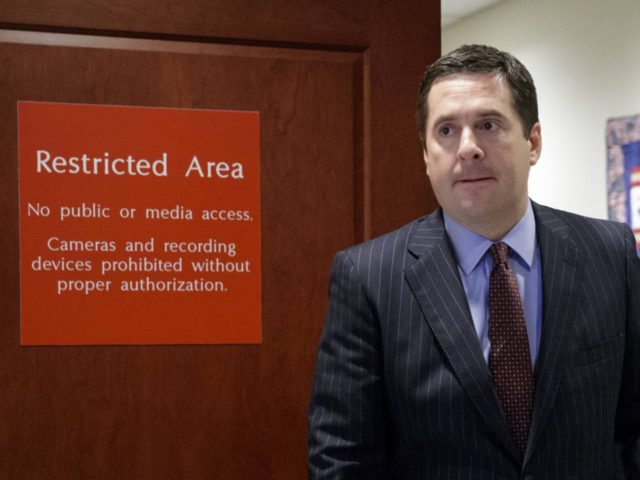Devin Nunes Has No Reason to Recuse Himself
The day after House Intelligence Committee Chair Devin Nunes, R-Calif., held a press conference saying he’d seen reports that show the government may have collected information on Donald Trump’s transition team or family and inappropriately shared it, journalists jumped into action. They did so not to dig into the accusation of a National Security Agency unmasking or a failure to minimize incidentally collected information — as they most surely would have had any Democrat been president — but to figure out where the congressman had been the past few days.
Most of the subsequent stories skipped over (or brushed past) the issue of abuse altogether to focus on the “incidental” nature of the accusation, which sounds innocent enough and is completely legal and not the issue. As Andrew McCarthy, who’s certainly no squish when it comes to FISA, explains on National Review:
“Of course, any legitimate government power can be abused. If the government’s real objective was to intercept the communications not of the foreigners but of the Trump associates, such that the agencies’ ‘targeting’ of the foreigners was merely a pretext (i.e., they were monitored only because they were in contact with Trump associates, who were the real targets), it could hardly be said that the associates’ communications were intercepted ‘incidentally.'”
This seemed to escape the attention of erstwhile civil libertarians who once breathlessly warned us about the potential abuses of intelligence services, specifically the dangers of politicians getting entangled in the exploitation of sensitive information. They wanted to know what Nunes had for dinner last Tuesday night.
Certainly, as part of the larger story, it’s legitimate and useful to cover Nunes’ actions. When it turned out that he had been on White House grounds — to use a Sensitive Compartmented Information Facility — it gave Democrats the space they needed to start demanding recusal.
“Calls Grow for Nunes to Step Aside in Inquiry on Surveillance,” read one New York Times headline. “The remarkable calls by Representatives Adam B. Schiff of California, the committee’s top Democrat,” it says, came after revelations that Nunes had met a source at the White House. Democrats claimed that a “bipartisan investigation” could no longer be achieved.

For starters, the idea that Schiff isn’t a full-blown partisan is preposterous. He’s already made a number of wild and irresponsible claims about Russia hacking our election. (The California representative contends to have evidence of collusion, though he has yet to share the specifics with the group.) There is no reason to treat him like the guardian of a chaste investigation. Others who went on the record to demand recusal were nonpartisan public servants like House Minority Leader Nancy Pelosi and Sen. Chuck Schumer.
The Times headline, by the way, could just as easily have read “Calls Grow for Nunes to Stay on in Inquiry on Surveillance.” Last night, Rep. Trey Gowdy said, “Jesus would not be a satisfactory chairperson to some of my Democratic colleagues.” Rep. Peter King, just as much (or little) a partisan as Pelosi, came out in defense of Nunes, as did others. These “calls” are just as real. (It’s also important to remember that GOP hawks who have been critical of Nunes — although none have asked for recusal — are also defenders of the NSA’s wide authority under FISA Section 702.)
Ostensibly, demanding recusal is framed as an effort to save the impartiality and integrity of the committee. In reality, it’s meant to create the impression that Nunes has done something unethical or illegal to defend President Trump. It’s meant to proactively poison any investigation. Schiff offers two reasons for his position: Nunes shared information with the White House, and Nunes got his information from someone in the White House.
Nunes has said this isn’t an inquiry into charges of Russian collusion, so why is it inappropriate for the House Intelligence Committee chair to share intelligence about the president with the president, and then let the world know he’s done so? Furthermore, why is it wrong for the chair to see classified information from a source at the White House? “If that’s where the information is, and the information is relevant, and it’s authentic, and it’s reliable, wouldn’t you go where the information was?” Gowdy asked The Weekly Standard.
Even if we concede, for the sake of argument, that Nunes had been ethically compromised, does the information obtained in the effort become less valid? Were the leaks that cost former White House national security adviser Mike Flynn his job any less persuasive because they were, according to Trump, illegally obtained? Haven’t many Democrats been defending the need for whistleblowers to speak up in the name of democracy?
Nunes has no reason to give up the name of his source. If the NSA abused its power and the evidence is legitimate, we should welcome the information. If not, Nunes’ credibility will be blown forever. Considering his history, the media had no reason to assume the latter, which mirrors the concerns and goals of Democrats.
Of course, Nunes might have nothing. If that’s the case, he’ll no doubt pay a steep political price. We’ll know soon enough.





